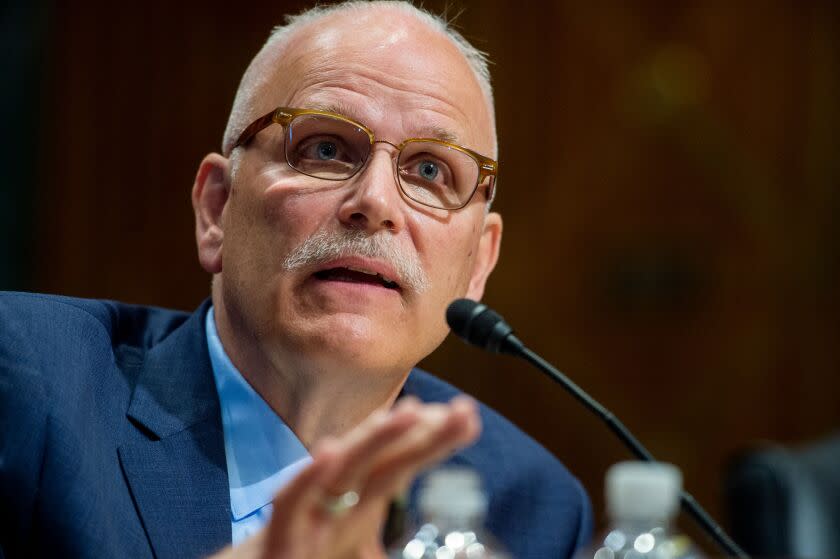U.S. border chief resigns after being told to leave

- Oops!Something went wrong.Please try again later.
- Oops!Something went wrong.Please try again later.
U.S. Customs and Border Protection Commissioner Chris Magnus resigned Saturday, a day after he revealed that Biden administration officials had wanted him to leave his role.
Magnus had said Friday that he would not comply with the request to step down, which he said came from Homeland Security Secretary Alejandro N. Mayorkas. Magnus, who is known as a progressive law enforcement leader, struggled to establish a public profile after his Senate confirmation in December.
The decision to resign came after a tumultuous week in the Department of Homeland Security, in which Magnus went public in an interview with The Times about the order from administration officials to leave his position as border chief.
“I resigned because I believe this decision provides me with the best path for advancing my commitment to professional, innovative, and community-engaged policing,” he said in a statement to The Times. “I appreciate having had this opportunity to serve and to work with many dedicated colleagues.”
Pressure was on Magnus as Republicans have pointed to the Biden administration’s struggles to keep up with an increasing number of migrants crossing the border.
In the last fiscal year, which ended in September, Customs and Border Protection recorded more than 2 million encounters with migrants at the border — a record high.
Karine Jean-Pierre, the White House press secretary, said President Biden accepted the resignation and thanked him for his service. Mayorkas told CBP staffers about the move in an email Saturday and informed them that Troy Miller, a career CBP official, would take over as head of the agency in an acting role.
In a conversation between the two men on Wednesday, as recounted by Magnus, Mayorkas said that he had lost confidence in him and if he didn’t resign, Mayorkas would recommend that Biden fire him.
The next day, John Tien, the second in command at the Department of Homeland Security, told Magnus that he should resign or else be fired within the next few days, Magnus said.
“I expressed to him that I felt there was no justification for me to resign when I still cared deeply about the work I was doing and felt that that work was focused on the things I was hired to do in the first place,” Magnus said.
One Biden administration official said that Magnus was regularly absent from meetings on border policy and was not heavily involved in the decision-making on key border policies. The official requested anonymity because the official was not authorized to speak publicly about the issue.
Magnus said he was not initially invited to meetings on border policy but later attended almost all key meetings.
On Twitter, he has been vocal about immigration issues, writing that Title 42, a measure instituted during the Trump administration that allows border agents to quickly turn back migrants, “comes at a heavy cost to many asylum seekers.” Magnus has tried to change the culture of Customs and Border Protection, which includes the Border Patrol. After criticism about offensive humor within the ranks, including Facebook posts that made fun of dead migrants and lawmakers, Magnus has clamped down on social media activity.
His goals included adding more female officers and tightening rules for pursuing migrants fleeing in cars.
Magnus rose to national prominence as chief of the Richmond Police Department in the Bay Area, and later becoming chief in Tucson. He said on Friday that some of the top leaders at Homeland Security did not "understand what reform even looked like within a law enforcement organization."
This story originally appeared in Los Angeles Times.

